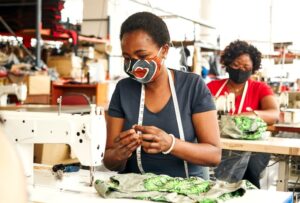On 7 February 2022, Anti-Slavery International was proud to support the formal opening of the Migrant Resource Centre (MRC) in Mauritius, celebrated with a ribbon cutting event.
We are proud to announce the official opening of the Migrant Resource Centre in Mauritius.
The MRC works to improve access to remedy for migrant workers in Mauritius. (1/3) pic.twitter.com/3GWlWASwaR
— Anti-Slavery International (@Anti_Slavery) February 9, 2022
The centre was built as part of a collaboration between Anti-Slavery International and a Mauritian trade union, Confédération des Travailleurs des Secteurs Publique et Privé (CTSP), and supported by ASOS and IndustriALL Global Union. Launched in 2019, with its formal opening delayed due to Covid-19, the MRC has offered crucial support to migrant workers on the island.
Since its inception, the MRC has been providing access to information to migrant workers on their rights, through a range of activities such as monthly awareness raising sessions. The key part of the MRC’s work, however, has been focused on supporting migrant workers to access remedy. Since February 2020, migrant workers from Bangladesh, Madagascar and India have gone to the MRC for help with grievances. As of end of February 2022, 64% of these grievances have been successfully closed.
Migrant workers: at risk of exploitation

Our support to the MRC is part of our objectives to end forced labour in global supply chains and to promote safe migration. Migrant workers are often highly vulnerable to exploitation when working in the private sector, due to issues that include the absence of safe migration routes, recruitment fees, the withholding of personal documents such as passports, and weak national legal protections for migrant workers.
When migrant workers’ rights are violated or migrants become subjected to forced labour, it’s often enormously difficult for them to access remedy for the harm caused. Access to remedy means that workers should be able to exercise their rights, report abuses and access effective remedies. Remedy does not only mean financial compensation, but can also involve apologies, restitution, rehabilitation, as well as steps to guarantee the prevention of further harm, for example. Migrant workers are often excluded, or face severe obstacles, in trying to claim their rights through formal state-led or legal remedy routes. Other non-state routes may also be off limits. For example, migrant workers may be unable to join trade unions. Employers may also use workers’ immigration status as a threat against them, meaning migrant workers face the risk of losing their livelihoods if they raise a grievance.
Faced with such obstacles, companies must therefore make sure that migrant workers in their supply chains have meaningful access to remedy. However, current company-led approaches to access remedy, such as company telephone hotlines, more often than not fail to achieve this. This is due to the lack of oversight, independence and accountability needed to secure migrant workers’ trust and guarantee effective remedy resolutions.
Our work in action: supporting migrant workers

In light of these issues, we’re calling for companies to shift away from these company-led approaches. Companies must instead support approaches where workers, or their credible representatives, are instead involved in the design, implementation and monitoring of access to remedy routes. Ultimately access to remedy approaches must be capable of addressing the power imbalance that typically exists between a migrant worker and their employer.
The MRC in Mauritius provides an excellent case study of how a “non-state-based grievance mechanism” that enables migrant workers to access effective remedy can be set up. To share our learnings from this work, we have published a business briefing “Migrant workers’ access to remedy”. This briefing provides an overview of the global context for migrant workers’ access to remedy, a summary of current approaches to grievance mechanisms, learnings from our work in Mauritius, and recommendations to businesses.
Companies must make sure that violations of migrant workers’ rights are addressed to meet their responsibilities under the United Nations Guiding Principles (UNGPs), particularly in consideration of ongoing efforts for the introduction of mandatory human rights and environmental due diligence in many countries and at EU-level. Our briefing offers specific recommendations to businesses on how to improve migrant workers’ access to remedy in their supply chains.
This includes:
- Promoting and supporting freedom of association across their supply chain for all workers
- Encouraging worker-driven solutions, whereby migrant workers’ representatives are part of the design and implementation process
- Making sure that access to remedy is available below the first tier of their supply chains, where migrant workers are often most vulnerable
The briefing builds on research work conducted between December 2020 and January 2021 on behalf of Anti-Slavery International in Mauritius, including the analysis of grievances submitted by migrant workers to the MRC. It is part of our wider work on a project that started in 2019 under the UK Home Office’s Modern Slavery Innovation Fund to reduce modern slavery in supply chains in Mauritius and has been undertaken in collaboration with CTSP, Bangladeshi NGO Ovibashi Karmi Unnayan Program (OKUP) and the Malagasy NGO Etudes Conseils FORMation Entrepreneuriat (ECFORME).
It’s essential that we support migrant workers if we’re serious about tackling forced labour in supply chains. With this briefing and the incredible work of the MRC in Mauritius, we’re one step close to that vision.